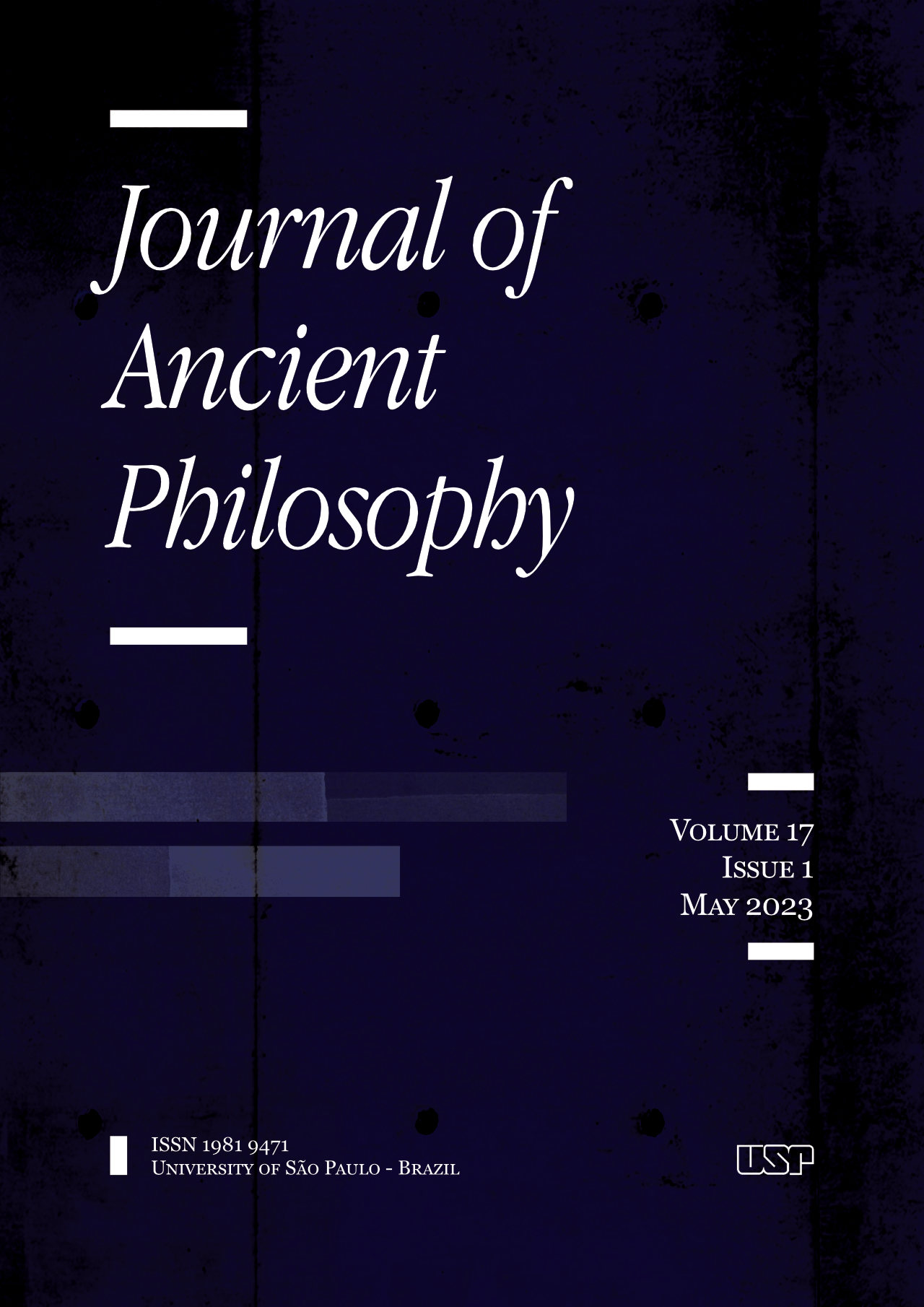Learning through Love: A Lover’s Initiation in the Symposium
DOI:
https://doi.org/10.11606/issn.1981-9471.v17i1p36-58Keywords:
Socrates, Diotima, ladder of love, initiation, leadershipAbstract
In the Symposium of Plato, Socrates reports that Diotima once described to him a process of initiation by which a lover rises from desiring one beautiful body to catching sight of what seems to be the Platonic form of beauty. Scholars have debated whether the lover is to make this ascent by a rational process or a non-rational one, or by both working either in concert or independently. This paper argues that love leads and guides a process in this initiation that necessarily involves rational activity. No teaching is necessary or appropriate, so that the process is an example of learning without being taught. The philosophical insight that results is life-changing, but it does not amount to the kind of knowledge that would fully satisfy a Socratic seeker after knowledge.
Downloads
References
Allen, R.E. The Dialogues of Plato, Volume II: The Symposium. New Haven and London: Yale University Press, 1991.
Blondell, Ruby (2006). “Where is Socrates on the ‘Ladder of Love’?” In Lesher, J.H., Nails, Debra, and Sheffield, Frisbee C.C. Plato’s Symposium. Issues in Interpretation and Reception. Cambridge, Massachusetts and London: Center for Hellenic Studies, 2006, pp. 147-78.
Bury, R.G. Plato: The Symposium. Cambridge: W. Heffer and Sons LTD 1909/1973.
Dover, Kenneth. Plato: Symposium. Cambridge: Cambridge University Press, 1980.
Gordon, Jill. Plato’s Erotic World: From Cosmic Origins to Human Death. Cambridge: Cambridge University Press, 2012.
Griffith, Tom. Symposium of Plato. Berkeley and Los Angeles: University of California Press, 1989.
Horn, Christoph. Platon: Symposion. Berlin: Akademie Verlag, 2012.
Lear, Gabriel R. “Plato on Why Human Beauty is Good for the Soul”. Oxford Studies in Ancient Philosophy LVII, 2019, pp. 26-64.
Lesher, J.H., Nails, Debra, and Sheffield, Frisbee C.C. Plato’s Symposium. Issues in Interpretation and Reception. Cambridge, Massachusetts and London: Center for Hellenic Studies, 2006.
Mitchell, Robert Lloyd. The Hymn to Eros: A Reading of Plato’s Symposium. Lanham: University Press of America, 1993.
Osborne, Catherine. Eros Unveiled: Plato and the God of Love. Oxford: Clarendon Press, 1994.
Prior, William. “The Portrait of Socrates in Plato’s Symposium”. Oxford Studies in Ancient Philosophy 31 (2006), pp. 137-166.
Nally, E.G. “Philosophy’s Workmate: Eros and the Erotica in Plato’s Symposium”. Apeiron 55, 2022, pp. 329-57.
Nehamas, Alexander, and Woodruff, Paul. Plato: Symposium. Indianapolis, Indiana: Hackett Publishing Company, 1989.
Reeve, C. D. C. “Plato on Begetting in Beauty (209e5-212c3)”. In Horn, Christoph. Platon: Symposion. Berlin: Akademie Verlag, 2012. Pp. 159-89.
Reeve, C. D. C . Blindness and Reorientation: Problems in Plato’s Republic. New York: Oxford University Press, 2013.
Renault, Mary. The Last of the Wine. New York: Pantheon,1956.
Rosen, Stanley. Plato’s Symposium. New Haven: Yale University Press, 1968.
Sheffield, Frisbee. Plato’s Symposium: The Ethics of Desire. Oxford: Oxford University Press, 2006.
Strauss, Leo. On Plato’s Symposium. Edited by Seth Benardete. Chicago: University of Chicago Press, 2001.
Taylor, A.E. Plato: The Man and His Work. London: Methuen, 1926.
Vlastos, Gregory. “The Individual as Object of Love in Plato”. In his Platonic Studies, 2d ed. Princeton: Princeton University Press, 1981. Pp. 3-34.
Woodruff, P. “Wrong Turns in the Euthyphro”. Apeiron 52.2, 2019. Pp. 117-136.
Woodruff, P. Living toward Virtue: Practical Ethics in the Spirit of Socrates. New York: Oxford University Press, 2022a.
Woodruff, P. “Finding Beauty in the Soul”. Tübinger Platon-Tage: Platon und das Schöne, 2022b. Forthcoming.
Downloads
Published
Issue
Section
License
Copyright (c) 2023 Paul Woodruff

This work is licensed under a Creative Commons Attribution-NonCommercial 4.0 International License.
Copyright
Authors who publish with this journal agree to the following terms:
- Authors retain copyright and grant the journal right of first publication with the work simultaneously licensed under a Creative Commons Attribution License (CC By 4.0) that allows others to share the work with an acknowledgement of the work's authorship and initial publication in this journal.
- Authors are able to enter into separate, additional contractual arrangements for the non-exclusive distribution of the journal's published version of the work (e.g., post it to an institutional repository or publish it in a book), with an acknowledgement of its initial publication in this journal.
- Authors are permitted and encouraged to post their work online (e.g., in institutional repositories or on their website) prior to and during the submission process, as it can lead to productive exchanges, as well as earlier and greater citation of published work (See The Effect of Open Access).


